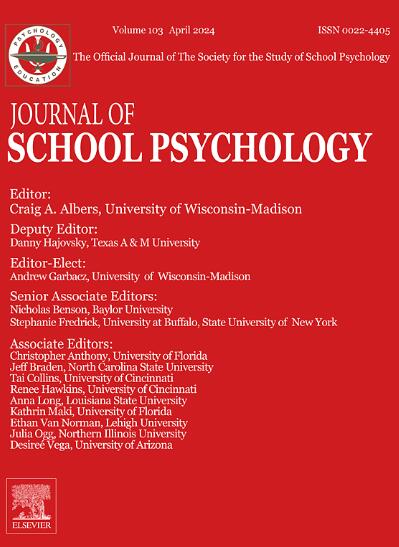验证性潜类分析的复制:以学校风气为例
IF 4.1
1区 心理学
Q1 PSYCHOLOGY, SOCIAL
引用次数: 0
摘要
同时,大型公共数据集的可用性和分析这些数据的强大计算软件的可访问性的增长加速了混合建模技术的使用,包括潜在类分析(LCA)。虽然使用LCA的二次数据分析在学校心理相关研究中越来越普遍,但这些分析技术的影响存在局限性。经常听到批评说,建模的结果可能是特定数据集的工件,而不是具有实际含义的更稳定和有意义的参与者响应模式。lca特异性复制指导对于支持这类研究的扩展是必要的。通过一个与学校气候相关的案例,我们为那些希望从探索性LCA转向确认性LCA (CLCA)的人提供指导。我们仔细研究了早期的LCA分析,该分析确定了2016-2017学年收集的学生学校气候调查数据的5类解决方案。使用2017-2018学年收集的学生学校气候感知数据(n = 24,051),我们的CLCA结果表明,响应模式具有很大的相似性。最初的探索性结果和本研究的验证性结果证明了学生学校气候体验的五种主要模式,表明五类解决方案在数据收集年份和全新的受访者中重复。认识到CLCA方法是相对新生的,我们描述了有兴趣利用CLCA的研究人员可能遇到的决策点,并提供指导,以帮助避免对可疑研究实践的指责。本文章由计算机程序翻译,如有差异,请以英文原文为准。
Replication using confirmatory latent class analysis: A school climate example
The simultaneous growth in the availability of large publicly available datasets and the accessibility of powerful computation software to analyze those data have accelerated the use of mixture modeling techniques, including latent class analysis (LCA). Though secondary data analysis using LCA is increasingly common in school psychologyrelated research, there exist limits to the impacts of these analytic techniques. It is common to hear critiques that modeled results may be artifacts of a specific dataset rather than more stable and meaningful participant response patterns with practical implications. LCA-specific replication guidance is necessary to support an expansion of studies of this type. Via a school climate-related case example, we provide guidance for those wishing to shift from exploratory LCA to confirmatory LCA (CLCA). We scrutinized an earlier LCA analysis that identified a 5-class solution for student school climate survey data collected during the 2016-2017 academic year. Using student school climate perception data (n = 24,051) collected during the 2017–2018 academic year, our CLCA results suggest substantial similarity in response patterns. The initial exploratory results and this study's confirmatory results demonstrate five predominant patterns of student school climate experiences, suggesting that the 5-class solution replicates across data collection years and with entirely new respondents. Recognizing that CLCA methods are relatively nascent, we describe decision-making points researchers interested in utilizing CLCA may encounter and provide guidance to help avoid accusations of questionable research practices.
求助全文
通过发布文献求助,成功后即可免费获取论文全文。
去求助
来源期刊

Journal of School Psychology
PSYCHOLOGY, EDUCATIONAL-
CiteScore
6.70
自引率
8.00%
发文量
71
期刊介绍:
The Journal of School Psychology publishes original empirical articles and critical reviews of the literature on research and practices relevant to psychological and behavioral processes in school settings. JSP presents research on intervention mechanisms and approaches; schooling effects on the development of social, cognitive, mental-health, and achievement-related outcomes; assessment; and consultation. Submissions from a variety of disciplines are encouraged. All manuscripts are read by the Editor and one or more editorial consultants with the intent of providing appropriate and constructive written reviews.
 求助内容:
求助内容: 应助结果提醒方式:
应助结果提醒方式:


